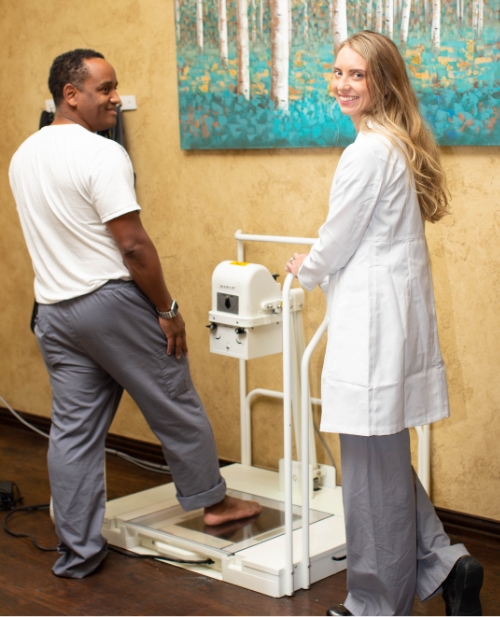Watch Dr. Verville explain the three most helpful ways to avoid pain while exercising.
As the strongest tendon in the human body, the strength of our Achilles tendon gives us the ability to walk. When this tendon is damaged in some way, walking becomes almost impossible. The tendon extends down the back of your leg, connecting your calf muscle to your heel bone. The two most common problems that can occur with your Achilles tendon are Achilles tendonitis and rupture of the Achilles tendon.
What is an Achilles Tendon Injury (Tendonitis)?
Achilles tendonitis is the inflammation of the tendon and may include small tears to the tendon. If left untreated, the condition can degenerate the tendon and lead to the rupture of the tendon.

Causes of Achilles Tendonitis
Achilles tendonitis is a common injury for people who play sports or run. These activities put too much pressure and strain on the tendon. Common causes of Achilles tendon injuries include:
Sports that require sudden stops and starts such as basketball, tennis, and track.
Flat feet or improper footwear.
Past injury or strain on the tendon.
Exercising without properly stretching.
Running uphill or climbing stairs.
Wearing shoes that do not fit well.
Exosomes Treatments for Achilles Tendon Injuries
If your Achilles tendonitis is the result of small tears and inflammation, RNV Podiatry has a treatment option to directly address those microinjuries: exosomes treatments. With the Evo Bio™ Exo NRA™ exosomes product, Dr. Verville can help you recover from an Achilles tendon injury more quickly.
Exosomes are extracellular vesicles that facilitate communication between cells. Specifically, in the muscles and ligaments of the body, exosomes are responsible for the release of growth factors that stimulate wound healing. Exosomes treatments are the strategic injection of exosomes into the ligaments to stimulate the healing of the tiny tears that cause inflammation. When used to address Achilles tendonitis, exosomes treatments can reduce pain and inflammation, shorten your recovery timeline, and improve mobility by making it more comfortable to move.
Achilles Tendonitis Diagnosis
During your physical exam at her office in Frisco, Dr. Verville will locate the source of your pain, tenderness, and swelling. She will also note your degree of tendon flexibility, alignment, range of motion, and reflexes of your foot and ankle.
Treatment Options for Achilles Tendonitis
Board Certified Dr. Verville will determine the optimal treatment options for your Achilles tendon based on your answers to questions during your consultation, results of your physical examination, and if necessary, imaging tests. While treatment will vary from person to person, Achilles Tendonitis is commonly treated by:
- Icing the injury and resting
- Wearing compression bands
- Elevating your foot
- Taking anti-inflammatory medication
- Incorporating stretching exercises
- Orthotic devices to alleviate pain and prevent re-injury
- Surgery and possibly a rehabilitation program
Options for treatment may vary based on the length of time the Achilles tendon injury has been present and the severity of the injury. If you suspect that you have this injury, you should immediately call a skilled podiatrist.
For more information on treating your Achilles Tendon Injury, call our office in Frisco at (214) 385-8822 to schedule an appointment with Dr. Verville.





